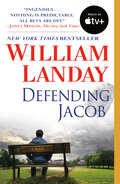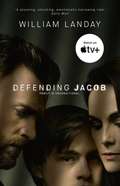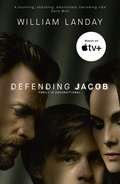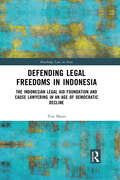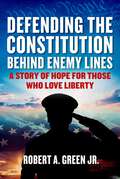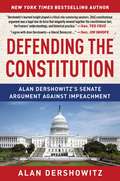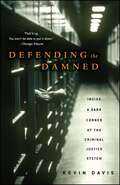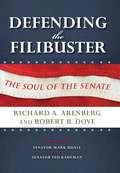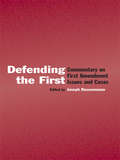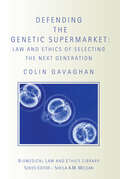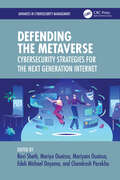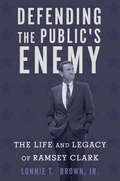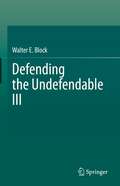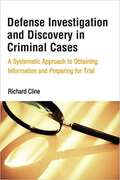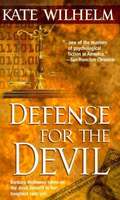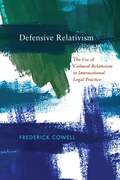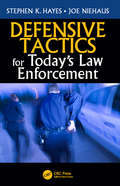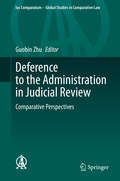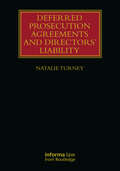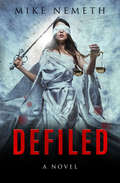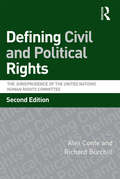- Table View
- List View
Defending Jacob: A Novel (Playaway Adult Fiction Ser.)
by William LandayAndy Barber has been an assistant district attorney in his suburban Massachusetts county for more than twenty years. He is respected in his community, tenacious in the courtroom, and happy at home with his wife, Laurie, and son, Jacob. But when a shocking crime shatters their New England town, Andy is blindsided by what happens next: His fourteen-year-old son is charged with the murder of a fellow student.Every parental instinct Andy has rallies to protect his boy. Jacob insists that he is innocent, and Andy believes him. Andy must. He's his father. But as damning facts and shocking revelations surface, as a marriage threatens to crumble and the trial intensifies, as the crisis reveals how little a father knows about his son, Andy will face a trial of his own--between loyalty and justice, between truth and allegation, between a past he's tried to bury and a future he cannot conceive.Award-winning author William Landay has written the consummate novel of an embattled family in crisis--a suspenseful, character-driven mystery that is also a spellbinding tale of guilt, betrayal, and the terrifying speed at which our lives can spin out of control.BONUS: This edition contains excerpts from William Landay's Mission Flats and The Strangler.
Defending Jacob: Includes exclusive new material to tie into the Apple TV series (Playaway Adult Fiction Ser.)
by William LandayNOW A MAJOR TV SERIES - FEATURING EXCLUSIVE NEW MATERIAL FROM THE AUTHOR.If your son was on trial for murder, what would you do?Andy Barber's job is to put killers behind bars. And when a boy from his son Jacob's school is found stabbed to death, Andy is doubly determined to find and prosecute the perpetrator.Until a crucial piece of evidence turns up linking Jacob to the murder. And suddenly Andy and his wife find their son accused of being a cold-blooded killer.In the face of every parent's worst nightmare, they will do anything to defend their child. Because, deep down, they know him better than anyone.Don't they?
Defending Jacob: Now a major Apple TV series
by William LandayNOW A MAJOR TV SERIESIf your son was on trial for murder, what would you do?Andy Barber's job is to put killers behind bars. And when a boy from his son Jacob's school is found stabbed to death, Andy is doubly determined to find and prosecute the perpetrator.Until a crucial piece of evidence turns up linking Jacob to the murder. And suddenly Andy and his wife find their son accused of being a cold-blooded killer.In the face of every parent's worst nightmare, they will do anything to defend their child. Because, deep down, they know him better than anyone.Don't they?
Defending Legal Freedoms in Indonesia: The Indonesian Legal Aid Foundation and Cause Lawyering in an Age of Democratic Decline (Routledge Law in Asia)
by Tim MannDefending Legal Freedoms in Indonesia provides fresh insights into how cause lawyers navigate political and institutional change, by presenting and analysing the Indonesian Legal Aid Foundation (YLBHI), the oldest and most influential legal and human rights organisation in Indonesia.Based on rich ethnographic research, this book charts the developments of the organisation since its founding in 1970, its contribution to the ending of the authoritarian, military-backed New Order (1966-1998), its relative decline in the years following Indonesia’s democratisation and its revival in recent years as Indonesian democracy and human rights come under threat. The author examines the tactics the organisation has used, including show trials and working alongside grassroots communities, organising them and educating them about their rights. It highlights how this organisation flourished more under an authoritarian regime than under democracy and how its present, prominent, adversarial-political version of cause lawyering is playing a leading role in civil society resisting further erosion of democracy and human rights. The book addresses recent democratic erosion under President Joko Widodo, and documents pivotal moments in Indonesia’s contemporary history, such as the ‘Reform Corrupted’ mass demonstrations in 2019, illuminating how democracy shrinks, and how lawyers push back.The first book on Indonesia’s crucially important cause lawyering, activist lawyers’ group, this book will be of interest to researchers in Asian Law, Indonesian Studies. It is also an essential point of reference for future research in public lawyering in Asia.
Defending Rorty
by William M. CurtisLiberal democracy needs a clear-eyed, robust defense to deal with the increasingly complex challenges it faces in the twenty-first century. Unfortunately much of contemporary liberal theory has rejected this endeavor for fear of appearing culturally hegemonic. Instead, liberal theorists have sought to gut liberalism of its ethical substance in order to render it more tolerant of non-liberal ways of life. This theoretical effort is misguided, however, because successful liberal democracy is an ethically demanding political regime that requires its citizenry to display certain virtues and habits of mind. Against the grain of contemporary theory, philosopher Richard Rorty blends American pragmatism and romanticism to produce a comprehensive vision of liberal modernity that features a virtue-based conception of liberal democracy. In doing so, Rorty defends his pragmatic liberalism against a host of notable interlocutors, including Charles Taylor, Nancy Fraser, Hilary Putnam, Richard J. Bernstein, and Jean Bethke Elshtain.
Defending the Constitution behind Enemy Lines: A Story of Hope for Those Who Love Liberty (Children’s Health Defense)
by Robert A. Green Jr.The story of a silenced minority who put their constitutional oaths before all else to keep our Founding Fathers' great gift of liberty alive. Defending the Constitution Behind Enemy Lines is an explosive, tell-all book, detailing the military COVID-19 vaccine mandate, and the resistance to that mandate by service members who could not, in good conscience, go along. As an actively serving Navy Commander, Robert A. Green Jr. removes the veil of military secrecy and complexity to shed light on the related unlawfulness and the official cover-up being committed by certain DoD leaders. His deep dive into the current crisis details the harms perpetrated against service members and their families as well as the destruction of military readiness that resulted. Standing upon his First Amendment rights, the first-time author analyzes the current crisis in light of the challenges faced by our Founding Fathers. His message to the American people is clear: The crisis our military is facing will only be solved by following in the footsteps of our Founding Fathers and returning to an adherence to the Constitution that our forebears sacrificed everything to leave us.
Defending the Constitution: Alan Dershowitz's Senate Argument Against Impeachment
by Alan Dershowitz&“Maybe the question isn&’t what happened to Alan Dershowitz. Maybe it&’s what happened to everyone else.&”—PoliticoIn Defending the Constitution, Alan Dershowitz—New York Times bestselling author and one of America&’s most respected legal scholars—makes an impassioned constitutional argument against the impeachment of President Donald Trump, just as he delivered it to the United States Senate. Alan Dershowitz has been called &“one of the most prominent and consistent defenders of civil liberties in America&” by Politico and &“the nation&’s most peripatetic civil liberties lawyer and one of its most distinguished defenders of individual rights&” by Newsweek. Yet he has come under intense criticism fire for applying those same principles, and his famed &“shoe‑on‑the‑other‑foot test,&” to Donald Trump, especially after arguing on the president&’s behalf before the U.S. Senate as it deliberated impeachment.Defending the Constitution seeks to refocus the debate over impeachment to the same standard that Dershowitz has upheld for decades: the law of the United States of America, as established by the Constitution. Citing legal examples from a long lineage of distinguished judges and attorneys, and examining the impeachment language in the Constitution itself, Dershowitz proves—first to the U.S. Senate, and now to readers everywhere—that President Trump should not have been impeached, and certainly should not be removed, for causes that do not meet the standards laid out by the founding fathers. This book is Alan Dershowitz&’s argument for a return to nonpartisan judgment based on the Constitution, for a preservation of the separation of powers and the checks and balances that make American government great. It is essential reading for anyone interested in or concerned about the impeachment of President Trump, and for everyone who cares about the future of U.S. government and society.
Defending the Damned: Inside Chicago's Cook County Public Defender's Office
by Kevin DavisChicago was the nation's deadliest city in 2001, recording 666 homicides. For lawyers in the Cook County Public Defender's Office Murder Task Force, that meant a steady flow of new clients. Eight out of ten people arrested for murder in Chicago are represented by public defenders. They're assigned the most challenging and seemingly hopeless cases, yet they always fight to win. One of those lawyers is Marijane Placek, a snakeskin boot-wearing, Shakespeare-quoting nonconformist whose courtroom bravado and sharp legal skills have made her a well-known figure around the courthouse. When an ex-convict was arrested on charges of killing a Chicago police officer that deadly year, Placek got the high-profile case, and her defense forms the hub around which the book's narrative revolves. Veteran journalist Kevin Davis reveals the compelling true story of a team of battle-scarred lawyers fighting against all odds. Unflinching, gripping, and full of surprises, Defending the Damned is an unforgettable human story and engaging courtroom drama where life and death hang in the balance. Davis explores the motives that compel these lawyers to come to work in this dark corner of the criminal justice system and exposes their insular and often misunderstood world. This groundbreaking work comes at a time when the country has seen how wrongful convictions have slipped through the system, that innocent people have been sent to death row, and that some police have lied or coerced suspects into confessing to crimes they did not commit. Such flaws drive these public defenders even harder to do their jobs, providing scrutiny to a long ignored and often broken system. Davis's reporting offers an unvarnished account of public defenders as never seen before. A powerful melding of courtroom drama and penetrating truecrime journalism, Defending the Damned is narrative nonfiction at its finest.
Defending the Filibuster: The Soul of the Senate
by Richard A. Arenberg Robert B. DoveRecent legislative battles over healthcare reform, the federal budget, and other prominent issues have given rise to widespread demands for the abolition or reform of the filibuster in the US Senate. Critics argue that members' traditional rights of unlimited debate and amendment have led to paralyzing requirements for supermajorities and destructive parliamentary tactics such as "secret holds." In Defending the Filibuster, a veteran Senate aide and a former Senate Parliamentarian maintain that the filibuster is fundamental to the character of the Senate. They contend that the filibuster protects the rights of the minority in American politics, assures stability and deliberation in government, and helps to preserve constitutional principles of checks and balances and separation of powers. Richard A. Arenberg and Robert B. Dove provide an instructive historical overview of the development of Senate rules, define and describe related procedures and tactics, examine cases related to specific pieces of legislation, and consider current proposals to end the filibuster or enact other reforms. Arguing passionately in favor of retaining the filibuster, they offer a stimulating assessment of the issues surrounding current debates on this contentious issue.
Defending the First: Commentary on First Amendment Issues and Cases (Routledge Communication Series)
by Joseph RussomannoDefending the First provides a collection of new perspectives on the First Amendment in legal and communication contexts. Editor Joseph Russomanno brings together a roster of major figures who have participated in the shaping of First Amendment law over the past 30 years. Readers are taken into a realm of personal experience and analysis through the stories of these attorneys at the forefront of the battle to defend the "First." The contributors to this volume--all of whom have argued cases before the Supreme Court--tell about their experiences appearing before the highest court in the United States. Some write many years after being there, while others offer insights from a more recent vantage point. One Supreme Court Attorney offers a historical analysis of a case replete with a variety of First Amendment issues.This work contributes to a deeper understanding of First Amendment issues and the types of expression that the First Amendment protects, and why these rights must be protected. In addition, it provides readers with the unique perspective of those who have been on the front lines of some of the most important and influential cases in this era. The challenges of presenting an argument in this venue become clear, and it is evident that understanding one's own case, its lineage, and its likely impact all become part of the formula for success.This distinctive collection provides personal and compelling insights into the making of communication law, and it will be engaging reading for students in communication law courses. It will also appeal to any reader interested in First Amendment law.
Defending the Genetic Supermarket: The Law and Ethics of Selecting the Next Generation (Biomedical Law and Ethics Library)
by Colin GavaghanThe controversial topic of the technology of Pre-implantation Genetic Diagnosis, and the muddled approach to this subject adopted by the UK Parliament, is explored in detail in this volume. The author takes the viewpoint that the HFEA has taken insufficient notice to date of certain core ethical principles and makes the case for a much more ethically consistent and humane system than has been managed so far. Arguing that many of the fears and objections levied against Robert Nozick’s notion of the ‘Genetic Supermarket’ by disability activists, christian bioethicists and radical feminists, amongst others, are internally inconsistent, philosophically unsound or merely highly improbable, the author considers a number of individual policy decisions of the HFEA and addresses such questions as: Can a case be made out for state involvement in such decisions? Who stands to be harmed by a supermarket model? Are any ethical principles or societal interests threatened by it? This book is an essential resource for law students of all levels and professionals working within or interested in medical and healthcare law and medical genetics.
Defending the Jury
by Laura I ApplemanThis book sets forth a new approach to twenty-first-century criminal justice and punishment, one that fully involves the community, providing a better way to make our criminal process more transparent and inclusive. Using the prism of the Sixth Amendment community jury trial, this book offers fresh and much-needed ways to incorporate the citizenry into the procedures of criminal justice, thereby resulting in greater investment and satisfaction in the system. It exposes the various challenges the American criminal justice system faces because of its ongoing failure to integrate the community's voice. Ultimately, the people's right to participate in the criminal justice system through the criminal jury - a right that is all too often overlooked - is essential to truly legitimizing the criminal process and ensuring its democratic nature.
Defending the Metaverse: Cybersecurity Strategies for the Next Generation Internet (Advances in Cybersecurity Management)
by Ravi ShethThis book is aimed at a diverse audience including students, researchers, academicians, cybersecurity professionals, IT managers, Metaverse developers, business leaders, policymakers, and tech enthusiasts. This book is for everyone—from beginners to experts, researchers, and students. It offers insights and tools suitable for people with different levels of knowledge, making it accessible to a wide range of readers. The book fits alongside other published books by addressing the rapidly evolving intersection of cybersecurity and the Metaverse, a niche yet increasingly critical area.Unlike traditional cybersecurity books that focus on current internet and IT infrastructures, this book uniquely targets the virtual environments of the Metaverse. It combines advanced technological insights with practical strategies, providing a specialized resource that bridges the gap between conventional cybersecurity literature and the futuristic needs of Metaverse security. This positions it as an essential read for those looking to stay ahead in the field of cybersecurity within the context of next-generation internet platforms.
Defending the Public's Enemy: The Life and Legacy of Ramsey Clark
by Lonnie T. BrownWhat led a former United States Attorney General to become one of the world's most notorious defenders of the despised? Defending the Public's Enemy examines Clark's enigmatic life and career in a quest to answer this perplexing question. The culmination of ten years of research and interviews, Lonnie T. Brown, Jr. explores how Clark evolved from our government's chief lawyer to a strident advocate for some of America's most vilified enemies. Clark's early career was enmeshed with seminally important people and events of the 1960s: Martin Luther King, Jr., Watts Riots, Selma-to-Montgomery March, Black Panthers, Vietnam. As a government insider, he worked to secure the civil rights of black Americans, resisting persistent, racist calls for more law and order. However, upon entering the private sector, Clark seemingly changed, morphing into the government's adversary by aligning with a mystifying array of demonized clients—among them, alleged terrorists, reputed Nazi war criminals, and brutal dictators, including Saddam Hussein. Is Clark a man of character and integrity, committed to ensuring his government's adherence to the ideals of justice and fairness, or is he a professional antagonist, anti-American and reflexively contrarian to the core? The provocative life chronicled in Defending the Public's Enemy is emblematic of the contradictions at the heart of American political history, and society's ambivalent relationship with dissenters and outliers, as well as those who defend them.
Defending the Undefendable III
by Walter E. BlockThis book probes the depths of libertarian philosophy and highlights the need for laws that protect all individuals in society. This book defines libertarianism as a theory of what is just law, it is predicated upon the non-aggression principle (NAP). This legal foundation of the libertarian philosophy states that it should be illicit to threaten or engage in initiatory violence against innocent people. Ultimately, this book presents the notion, defend the “undefendable.” This book defines that as; any person, institution, professional, worker, which is either reviled by virtually everyone, or prohibited by law, and does not violate the NAP. Weaved throughout, this book uses political philosophy to present three fundamental premises to explain this libertarian point of view. Firstly, this book defines the non-aggression principle (NAP). Secondly, demonstrates the importance and relevance of private property rights in this context. This book uses practical examples to demonstrate the theoretical application of freedom rights using libertarianism principles.
Defense Investigation and Discovery in Criminal Cases: A Systematic Approach to Obtaining Information and Preparing for Trial
by Richard ClineWritten by a seasoned criminal defense attorney, Defense Investigation and Discovery in Criminal Cases shares trial-tested investigation and discovery methods. The book combines an exploration of theoretical and jurisprudential concepts that govern a defendant’s right to obtain information from the prosecutor with practical advice on integrating discovery information into an effective defense. <p><p>This book examines the history of discovery in criminal cases, including the defendant’s due process right recognized in Brady and its progeny, while exploring constitutional, statutory, and rule-based arguments to compel the government to provide discovery to defendants. <p><p>The author includes a fifty-state survey on discovery rules and statutes that identifies the trend toward more liberal discovery and provides tools for defense counsel in jurisdictions where discovery is limited. Additionally, this essential title highlights innovative ways that defense counsel can get the information they need outside of the traditional discovery process and lays out ethical standards for professional conduct as it relates to the right of discovery. The author provides “use it today” sample motions that any criminal defense attorney will appreciate.<p><p> A perfect combination of theoretical and practical, Defense Investigation and Discovery in Criminal Cases is an invaluable resource for criminal defense attorneys.<p><p>Richard Cline has practiced criminal defense in Columbus, Ohio since 1981, after spending a year prosecuting misdemeanor cases. Mr. Cline has been AV rated by Martindale-Hubbell for over ten years, was named a 2010 Top Lawyer by Columbus CEO magazine, and was selected as a Super Lawyer in Ohio for 2010 and 2011. Mr. Cline has tried several capital cases in state court as well as felony cases in both state and federal court. In addition to his trial work, Mr. Cline is a frequent continuing legal education lecturer on legal ethics, professionalism, criminal advocacy, and appellate practice.
Defense Perspectives on International Criminal Justice
by Gentian Zyberi Colleen RohanThis examination of the role of the defence in international criminal proceedings highlights it's contribution to the development of international criminal law and the fair administration of international criminal justice. Written by leading international practitioners and scholars, it combines the practice and theory of international criminal law in order to provide a first-hand perspective on the challenges involved in the good administration of international criminal justice. The authors examine, among other issues, the role of the defence during the different stages of international criminal proceedings, the key aspects of defence work which ensure the right of the accused to a fair trial, professional ethics, the United Nations Residual Mechanism for International Tribunals, and post-conviction remedies and issues relating to those serving prison sentences.
Defensive Relativism: The Use of Cultural Relativism in International Legal Practice (Pennsylvania Studies in Human Rights)
by Frederick CowellDefensive Relativism describes how governments around the world use cultural relativism in legal argument to oppose international human rights law. Defensive relativist arguments appear in international courts, at the committees established by human rights treaties, and at the United Nations Human Rights Council. The aim of defensive relativist arguments is to exempt a state from having to apply international human rights law, or to stop international human rights law evolving, because it would interfere with cultural traditions the state deems important. It is an everyday occurrence in international human rights law and defensive relativist arguments can be used by various types of states. The end goal of defensive relativism is to allow a state to appear human rights compliant while at the same time not implementing international human rights law.Drawing on a range of materials, such as state reports on the Convention on the Elimination of All Forms of Discrimination Against Women (CEDAW) and cases from the European Court of Human Rights involving freedom of religion, this book provides a definitive survey of defensive relativism. Crucially, Frederick Cowell argues, defensive relativism is not about alternative practices of human rights law, or debates about the origins or legitimacy of human rights as a concept. Defensive relativism is instead a variety of tactical argument used by states to justify ignoring international human rights law. Yet, as Cowell concludes, defensive relativism can’t be removed from the law, as it is a reflection of unresolved tensions about the nature of what it means for rights to be universal.
Defensive Tactics for Today’s Law Enforcement
by Stephen K. Hayes Joe NiehausFew of the many defensive tactics books on the market include the training and methods of martial arts. Drawing on the centuries-old techniques of Ninjutsu, Defensive Tactics for Today’s Law Enforcement offers alternatives to the traditional police defensive tactics taught to most officers. This text stresses relying on natural tendencies in a violent encounter to ensure officer safety and to better utilize the techniques and training officers do receive. By integrating existing training with martial arts expertise, Defensive Tactics provides officers access a full complement of techniques to better navigate physical conflict safely and effectively. Intended for law enforcement practitioners, as well as practitioners of any other professions that present a personal security risk, Defensive Tactics for Today’s Law Enforcement will better equip readers with a diverse range of defensive tactics.
Deference to the Administration in Judicial Review: Comparative Perspectives (Ius Comparatum - Global Studies in Comparative Law #39)
by Guobin ZhuThis book investigates judicial deference to the administration in judicial review, a concept and legal practice that can be found to a greater or lesser degree in every constitutional system. In each system, deference functions differently, because the positioning of the judiciary with regard to the separation of powers, the role of the courts as a mechanism of checks and balances, and the scope of judicial review differ. In addition, the way deference works within the constitutional system itself is complex, multi-faceted and often covert. Although judicial deference to the administration is a topical theme in comparative administrative law, a general examination of national systems is still lacking. As such, a theoretical and empirical review is called for. Accordingly, this book presents national reports from 15 jurisdictions, ranging from Argentina, Canada and the US, to the EU. Constituting the outcome of the 20th General Congress of the International Academy of Comparative Law, held in Fukuoka, Japan in July 2018, it offers a valuable and unique resource for the study of comparative administrative law.
Deferred Prosecution Agreements and Directors’ Liability (ISSN)
by Natalie TurneyThis book provides in-depth analysis of deferred prosecution agreements (DPAs), a tool first introduced in the United States and since implemented in the United Kingdom and other jurisdictions. The central focus of the book is the impact of DPAs on company directors: DPAs were first introduced in the US for individuals, but are now used predominantly for corporate defendants. In the UK, DPAs have only ever been available for companies.The consideration of individuals in the introductory stage in the UK is explored in depth, as well as the consideration and targeting of individuals in cases that have followed. Company directors are exposed to liability because of this negotiated deal between the company and prosecutors, and this book addresses the key areas of exposure, and how various parties should address these risk areas in accordance with the law. The book is an increasingly necessary contribution to the topical discussion of the fallout of unsuccessful prosecutions of individuals implicated in the wrongdoing constituting the basis of DPAs, calling into question not only treatment of those individuals but also the integrity of the DPA tool itself. It also considers the impact of DPAs and arising exposures on directors’ and officers’ (D&O) liability insurance, therefore covering potential risk areas and the ability of directors to access a defence in protecting themselves from liability. The book covers the impact on all areas of a D&O policy, considering D&O policy wording and insurance law in doing so, providing a rounded account of issues arising in relation to company directors and how interested parties can act in the best interests of all whilst in accordance with law and policy.The primary audience for this book will be lawyers and practitioners in the corporate crime and/or insurance law space, including general counsels, solicitors, barristers, consultants, prosecuting authorities, legal academics, and so forth. It will also be of interest to company directors, and to students of financial crime, corporate criminal crime and insurance law, and will have great international appeal. Organisations likely to use the book will include prosecuting authorities, law firms working on corporate criminal liability or D&O insurance cases, and companies looking to protect themselves where there is alleged wrongdoing.
Deficits in EU and US Mandatory Environmental Information Disclosure
by Dirk BüngerIt is the publicity about the Pollutant Release Inventory's data which creates an incentive for firms to achieve emission reductions. Accordingly, public access to environmental information constitutes a core characteristic of the aforementioned inventory. Here, in essence, two facets arise. First, with regard to the collection, it is disputed whether such information, which may comprise confidential commercial and industrial information in the EU as well as trade secrets in the US, can be protected under fundamental and constitutional property rights respectively. Second, in the context of dissemination and utilisation, it is arguable whether the information indeed impacts polluters and produces an outcome that secures a certain level of environmental protection. The author responds to the first issue by taking the EU and US jurisdictions into account and strives to analyse how this novel form of Internet disclosure liberates market mechanisms in the quest for effective and efficient emission reductions.
Defiled: A Novel
by Mike NemethNemeth &“knows how to build suspense&” is this legal thriller about a bitter divorce that takes a frightening twist (Publishers Weekly). Florida entrepreneur Randle Marks has just been served with divorce papers by his wife Carrie. It&’s not a shock. Conniving, loveless, and adulterous, she&’s more of a threat. Randall&’s new startup is about to go global, and the millions he&’ll rack up will be fair game. He needs a master manipulator on his side—someone like attorney Tony Zambrana who&’s already devising a cunning strategy to outwit the voracious soon-to-be divorcée. But Carrie has more on her side than Randle can imagine: outdated laws, shady judges, a dogged detective, and a cutthroat publicity-hungry prosecutor. Not to mention Carrie&’s capricious twin sister, and the greedy officers of the court who are more than willing to pit one bull against the other. To win at this increasingly brutal contest, Randle agrees to become the bait in an elaborate and dangerous trap. But for both Carrie and Randle, the cost of losing could be their very lives.
Defining Civil and Political Rights: The Jurisprudence of the United Nations Human Rights Committee
by Alex Conte Richard BurchillDefining Civil and Political Rights provides a comprehensive analysis and commentary on the decisions - technically known as views - of the United Nations Human Rights Committee, for use by human rights lawyers throughout the world. Each of the substantive rights and freedoms set out in the International Covenant on Civil and Political Rights is considered in detail, by analysis of final reviews and comments of the Human Rights Committee. This second edition has been thoroughly revised and updated to take account of recent jurisprudence on the Human Rights Committee. New material has been added based upon substantive areas of the committee's jurisprudence.
